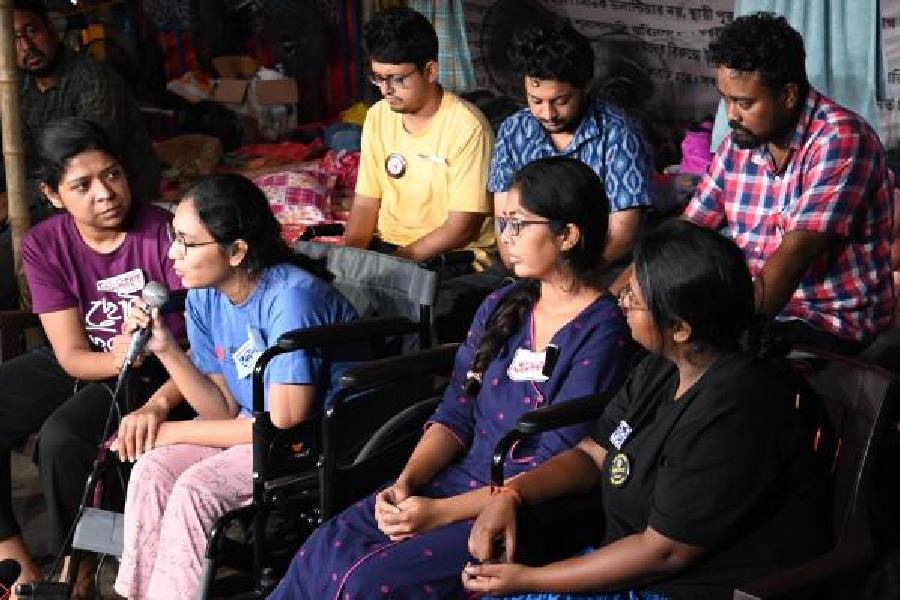The Junior Doctors’ Front that spearheaded the protests against deficiencies in Bengal’s healthcare system in the wake of a doctor’s rape and murder at RG Kar Medical College and Hospital wrote to the state chief secretary on Friday their suggestions on some of the changes proposed by the government.
The foremost among them is what they described as “critical deficiencies” in the central referral system, now being tried through a pilot project.
The letter was in response to an invitation from the government to the junior doctors to participate in any effort to improve the system.
The doctors’ letter says there are “critical deficiencies in the Central Referral System (CRS). The Standard Operating Procedures (SOP) for the CRS, published on 14.10.24, failed to address two pivotal issues: 1. The lack of bed availability at the referred hospital. 2. Insufficient infrastructure, drugs, and specialist doctors are required to treat referred patients”.
“It is concerning that despite assurances from the government, the central real-time digitalised bed vacancy monitoring system remains unimplemented, even at a pilot level. This system is critical to the functioning of any referral process. Without real-time, centralised data on bed availability, the referral system cannot operate efficiently,” says the email.
The mail was sent after the chief minister in a meeting with the protesting junior doctors on Monday sought suggestions from them on how the new systems being tried out could be bettered.
The state government had on October 15 launched the central referral system — one of the key demands of the protesting junior doctors — which is intended to ensure that a government hospital refers a patient to another state-run hospital only if the latter has a vacant bed and the facilities to treat the patient.
A pilot project was launched with MR Bangur Hospital in Tollygunge being named the destination hospital for referrals.
A junior doctor associated with MR Bangur Hospital said although a pilot project is underway, the required infrastructure has yet to be developed.
“Apart from ensuring adequate beds, drugs and specialist doctors, the government must engage a dedicated workforce, instead of burdening the doctors with the task of running the
new facility. There is also a lack of clarity on how the system
will work,” the junior doctor
said.
The Junior Doctors’ Front’s email says: “Given the existing workload faced by medical professionals, it is entirely unreasonable to task doctors with entering data into the CRS. Dedicated data entry operators must be assigned to this role. Failure to do so will further burden healthcare providers and compromise the accuracy and timeliness of the data entered.”
The junior doctors had flagged this concern when they interacted with the chief minister on Monday.
When the junior doctors demanded that a dedicated workforce be engaged to run the system, instead of tasking the doctors with entering data into the central referral system, the chief minister said the doctors should play a role in the system.
Debasish Halder, one of the faces of the junior doctors’ protests, said they are insisting on developing a flawless referral system because the patients’ families or acquaintances often get angry and assault doctors when they are unable to ensure admission.
“If we have a robust referral facility equipped with the availability of beds, drugs, and specialist doctors, the relatives of the patients won’t have to run from one hospital to another in search of a bed,” said Halder.
Aniket Mahata, a postgraduate trainee at RG Kar Medical College and Hospital and one of the doctors who had joined the fast unto death at Esplanade, said: “In the last mail which we received from the chief secretary, we were told to give our suggestions regarding what we sought for the development of the health facility. We were advised to reply within two days. So we mentioned all the points that we deemed crucial. The chief minister had on Monday also suggested that we come up with inputs on the referral system and bed vacancy updates.”
Calls and text messages from this newspaper to chief secretary Manoj Pant went unanswered.
A health department official said: “We are glad the junior doctors have come up with their suggestions to improve the healthcare system. We will go through the suggestions. A state task force has been set up with their representatives. We can discuss their suggestions at a meeting of the task force.”
Pant sent an email to the junior doctors around 3pm on Tuesday informing them that the state-level task force to ensure their security at workplaces and improvement of the healthcare system had been set up.
Two junior resident doctors, two senior resident doctors and a female medical student will join the task force as members.











